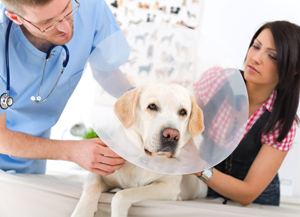How to Take Care of Your Dog after Surgery?


The process of surgery is full of apprehensions for both the dog and the pet owner. Generally the process of recovery is quite simple, but especial care has to be given to the dog during the first few weeks after surgery.
During this period, the dog may feel exhausted, sleepy and groggy. It may have poor balance and improper motor control. Nausea, panting, vomiting, loss of appetite and loss of bladder control are some of the other expected conditions. Usually special care is needed during first two days after surgery.
Following are the ways which can help to take care of the dog after surgery:
- Keeping the dog warm: Due to the wearing effects of the anesthesia, the dog is not able to understand the difference between hot or cold; so for helping it out, the temperature of the room has to be adjusted accordingly.
- Keeping the dog on the floor: In spite of gone effects of anesthesia; the dog may experience few stumbles and might also fall off from the bed or couch during a couple of days. Hence, it is advisable to keep it in a comfortable place is advisable.
- Keeping it segregated from kids and other pets: It is quite likely that it might get hurt by kids or pets while they try to play with it. Hence, for the safety of the dog it should be kept in isolation.
-

- Taking it outside after every few hours: For some days the dog has to be frequently taken out as it may have an excessive tendency to urinate (due to excessive intake of fluids during operation). It is also advisable to not let it sleep on something which could not be cleaned up as it might pee during sleep.
- Giving it a lot of water: As there is excessive requirement of fluids in the body for quick recovery; it should be given more liquids than usual.
- Giving it small meals of bland food: It would help the dog to eat only if it is hungry and not for taste. This would help in avoiding the chance of vomiting or nausea.
- Cleaning the wound properly after surgery: It would aid in quick healing of the wound and would avoid the chance of infection and further complication. The advice given by the vet should be followed for this purpose. Generally the wound is cleaned with salt water or Betadine solution. The wound should be checked regularly, to find out if it is healing. Though it is quite normal to have leaking blood from it; yet any other type of leaking in the form of pus or yellow or white fluid can be dangerous. A vet should be immediately consulted in such a situation.
- Preventing it to lick the wound: It might cause infection and hence has to be avoided.
- Taking it for leashed walk: For a few days it should be taken out for shorter walks. It is necessary to prevent it from walking too fast, running or jumping; for this purpose, it should be taken out with a leash.
- Keeping it dry: Giving it bath should be avoided in the first few weeks. While taking it out, it should be dry. In case it is raining, the wound should be covered with a bandage and plastic.

Hailing from Delhi, Prateek Tiwari is an avid animal lover who believes in Mahatma Gandhi’s quote “The greatness of a nation can be judged by the way its animals are treated.” A graduate in Biotechnology, he has vast knowledge about different breeds of pets and pet food that are both nutritious and promote healthy growth. In order to make people aware about pets and pet care, he shares his expertise through his blog posts.

![]() +91-8744012053
+91-8744012053
.png)


![]() +91-8744012053
+91-8744012053
.png)


